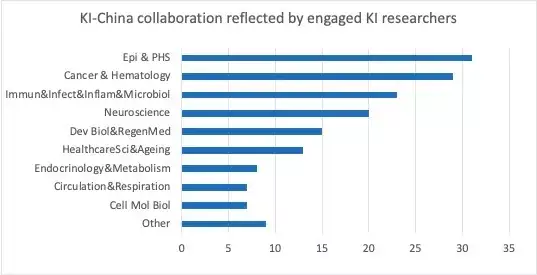Research collaboration
KI-China research collaborations encompass a wide range of biomedical research subjects, and the most active fields are epidemiology and public health, cancer and hematology, immunology and inflammation, as well as neurosciences. It is estimated that KI researchers are currently conducting more than 80 collaborative projects in China.

The majority of research collaborations are research interest-driven individual collaborations which takes place directly between researchers and are not centrally regulated. The collaborations are undertaken with cooperators mainly from leading Chinese universities in the east costal region of China, with more activities concentrated to Shanghai, Shandong, Guangzhou and Beijing.
There are a few exceptions, where collaborative agreements and activities are initiated and supported centrally. KI have signed university level agreements with selected and strategic Chinese partner universities.
Collaborative agreements
KI has signed Memoranda of Understanding (MOU) with the following universities:
- CAMS PUMC (Chinese Academy of Medical Sciences Peking Union Medical College)
- Shandong University
- Shanghai Jiao Tong University School of Medicine
- Fudan University Shanghai Medical College
- Peking University and PKU Health Science Center
- Chinese University of Hong Kong
International collaboration guidelines and references
All KI-China collaboration must be mutually beneficial and in close adhesion to ethical principles, academic freedom, as well as Swedish and Chinese laws and regulations.
- The Governments approach in work related to China
- KI Strategy 2030
- STINT report: Academic collaboration Sweden-China (2018)
- STINT report: Recommendations to higher education institutions om how to work with responsible Internationalisation (2022)
- STINT report: Guidelines for reflection on international academic collaboration (2020)
- Leiden AsiaCentre: Report Assessing Europe-China Collaboration in Higher Education and Research
- DVCS German recommendations
- European Commission’s Science and Knowledge Service: Science for Policy Briefs 2021 - China overtakes the EU in high-impact publications
- Swedish National China Centre: EU recommendations on tackling foreign interference in research and innovation implications for European research collaboration with China (2023)
- UI paper: Diplomacy in a changing world order: the role of strategic partnerships (2019)
